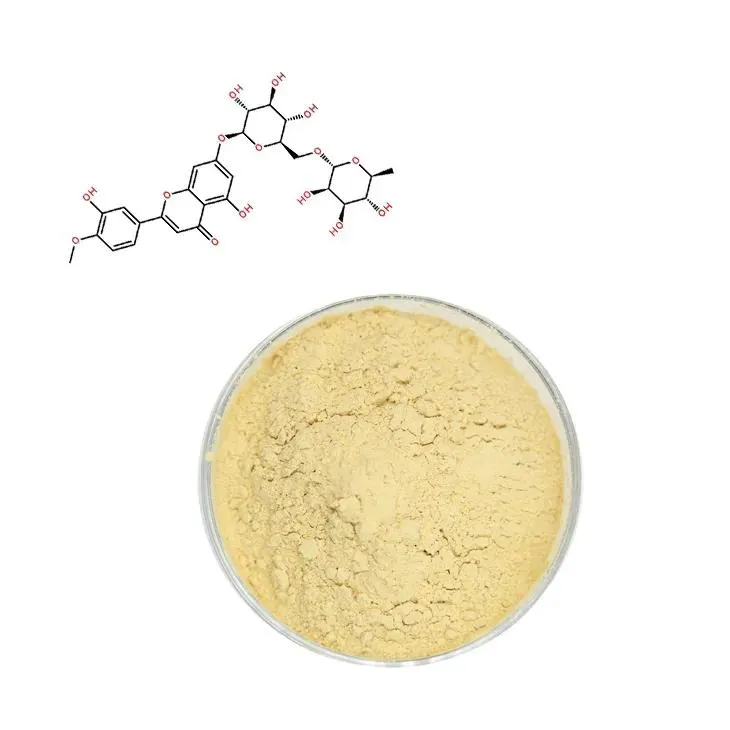- 0086-571-85302990
- sales@greenskybio.com
Is Diosmin an Antibiotic?
2025-07-15

In the vast landscape of pharmaceuticals and dietary supplements, Diosmin emerges as a noteworthy compound primarily recognized for its vascular benefits. Diosmin, a flavonoid found naturally in citrus fruits, has been the subject of extensive research due to its potent therapeutic properties. While it is celebrated for its role in vascular health, a common misunderstanding is whether Diosmin functions as an antibiotic. In this article, we will explore what diosmin really is, clarify its properties, and highlight its health benefits beyond antimicrobial activity.
Understanding Diosmin
Diosmin is classified as a flavonoid, a type of compound abundant in numerous fruits and vegetables. It is particularly concentrated in citrus fruits such as oranges and lemons. As a flavonoid, diosmin boasts a range of health-supporting properties, contributing to its popularity in supplements and therapeutic applications.
Comprehending the potential effects of diosmin requires a basic understanding of what distinguishes antibiotics from other types of compounds. Antibiotics are specifically designed to combat bacterial infections by either killing bacteria or inhibiting their growth. They are typically prescribed to manage infections and prevent the proliferation of harmful bacteria. Diosmin, despite its beneficial health effects, does not function in this manner, nor does it possess antimicrobial capabilities typically associated with antibiotics.

The Vascular Benefits of Diosmin
Known for its vein-supporting properties, diosmin's benefits primarily revolve around vascular health. It is frequently utilized in treating conditions associated with veins, including chronic venous insufficiency, varicose veins, and hemorrhoids. Diosmin exhibits vasoprotective effects, promoting the tone and elasticity of veins and improving blood circulation.
Research has demonstrated that diosmin enhances venous function by improving lymphatic drainage and reducing inflammation in the veins. Its capability to raise venous tone contributes to improved blood flow and prevention of edema, or swelling, caused by fluid accumulation. This attribute is particularly beneficial for individuals struggling with venous insufficiency, which can result in symptoms such as leg swelling, pain, and varicose veins.
Beyond chronic venous conditions, diosmin has shown promise in the management of hemorrhoids. By improving circulation and reducing inflammation, diosmin can alleviate symptoms associated with hemorrhoids and support recovery.
Anti-Inflammatory and Antioxidant Properties
Distinct from antibiotics, diosmin showcases robust anti-inflammatory and antioxidant properties. These attributes contribute to diosmin's efficacy in managing conditions where inflammation and oxidative stress play a role. Inflammation, a biological response to harmful stimuli, can become chronic and contribute to the pathogenesis of numerous diseases. Diosmin's ability to modulate inflammatory pathways enhances its therapeutic potential beyond antibiotic activity.
As an antioxidant, diosmin helps combat oxidative stress—a condition characterized by an imbalance between free radicals and antioxidants in the body. By neutralizing free radicals, diosmin reduces oxidative damage to cells, supporting overall health and well-being. This antioxidant activity complements its vascular benefits, contributing to improved cardiovascular health.
Diosmin in Skincare
Though not an antibiotic, diosmin is increasingly found in skincare products due to its beneficial properties for skin health. Its anti-inflammatory and antioxidant qualities make diosmin a valuable component in formulations aimed at soothing skin and reducing signs of aging.
Diosmin's role in promoting blood circulation enhances skin health by facilitating the delivery of oxygen and nutrients to skin cells. Improved circulation can lead to healthier, more radiant skin, while its antioxidant properties help protect the skin from environmental damage and oxidative stress.
Considerations and Safe Use of Diosmin
For individuals considering diosmin supplementation or topical application, understanding its potential benefits and limitations is crucial. As it does not possess antibiotic capabilities, diosmin should not be used in place of prescribed antibiotics for bacterial infections. If bacterial infections are suspected, professional medical advice and appropriate treatment are necessary.
For safe usage, diosmin supplements should be chosen from reputable sources, and individuals should adhere to recommended dosages. Consulting healthcare professionals before adding diosmin to a regimen is advised, especially for those with underlying health conditions or those currently taking other medications.
Conclusion
In conclusion, diosmin is not an antibiotic, but a powerful flavonoid with distinct health benefits separate from antimicrobial activity. Predominantly recognized for its vascular advantages, diosmin supports vein health, manages inflammation, and offers antioxidant protection. While it is not appropriate for bacterial infection management, diosmin serves as an ally in promoting cardiovascular health and overall well-being. By accurately understanding diosmin's role, individuals can make informed decisions about incorporating it into their health routine, complementing traditional treatments and enhancing general health practices.
- ▶ Hesperidin
- ▶ Citrus Bioflavonoids
- ▶ Plant Extract
- ▶ lycopene
- ▶ Diosmin
- ▶ Grape seed extract
- ▶ Sea buckthorn Juice Powder
- ▶ Fruit Juice Powder
- ▶ Hops Extract
- ▶ Artichoke Extract
- ▶ Mushroom extract
- ▶ Astaxanthin
- ▶ Green Tea Extract
- ▶ Curcumin
- ▶ Horse Chestnut Extract
- ▶ Other Product
- ▶ Boswellia Serrata Extract
- ▶ Resveratrol
- ▶ Marigold Extract
- ▶ Grape Leaf Extract
- ▶ New Product
- ▶ Aminolevulinic acid
- ▶ Cranberry Extract
- ▶ Red Yeast Rice
- ▶ Red Wine Extract
-
Cactus Extract
2025-07-15
-
Longan Extract
2025-07-15
-
Peppermint Extract Powder
2025-07-15
-
Lemon Extract
2025-07-15
-
Sophora Japonica Flower Extract
2025-07-15
-
Wheat Germ Extract
2025-07-15
-
Ginseng Root Extract
2025-07-15
-
Citrus Aurantium Extract
2025-07-15
-
Cassia Seed Extract
2025-07-15
-
American Ginseng Root Extract
2025-07-15





















